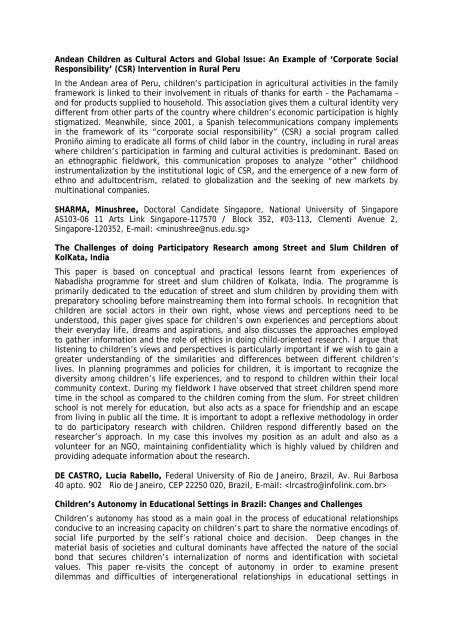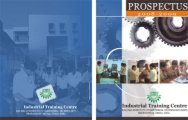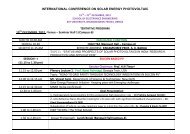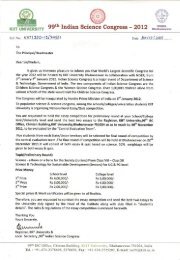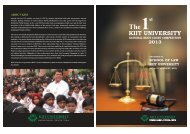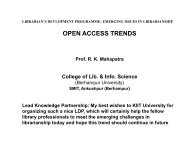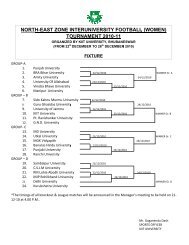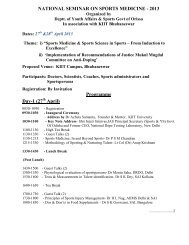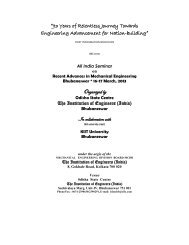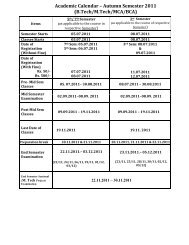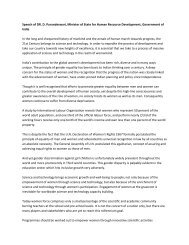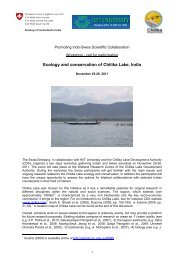PANEL ORGAN - KIIT University
PANEL ORGAN - KIIT University
PANEL ORGAN - KIIT University
You also want an ePaper? Increase the reach of your titles
YUMPU automatically turns print PDFs into web optimized ePapers that Google loves.
Andean Children as Cultural Actors and Global Issue: An Example of ‘Corporate Social<br />
Responsibility’ (CSR) Intervention in Rural Peru<br />
In the Andean area of Peru, children’s participation in agricultural activities in the family<br />
framework is linked to their involvement in rituals of thanks for earth – the Pachamama –<br />
and for products supplied to household. This association gives them a cultural identity very<br />
different from other parts of the country where children’s economic participation is highly<br />
stigmatized. Meanwhile, since 2001, a Spanish telecommunications company implements<br />
in the framework of its “corporate social responsibility” (CSR) a social program called<br />
Proniño aiming to eradicate all forms of child labor in the country, including in rural areas<br />
where children’s participation in farming and cultural activities is predominant. Based on<br />
an ethnographic fieldwork, this communication proposes to analyze “other” childhood<br />
instrumentalization by the institutional logic of CSR, and the emergence of a new form of<br />
ethno and adultocentrism, related to globalization and the seeking of new markets by<br />
multinational companies.<br />
SHARMA, Minushree, Doctoral Candidate Singapore, National <strong>University</strong> of Singapore<br />
AS103-06 11 Arts Link Singapore-117570 / Block 352, #03-113, Clementi Avenue 2,<br />
Singapore-120352, E-mail: <br />
The Challenges of doing Participatory Research among Street and Slum Children of<br />
KolKata, India<br />
This paper is based on conceptual and practical lessons learnt from experiences of<br />
Nabadisha programme for street and slum children of Kolkata, India. The programme is<br />
primarily dedicated to the education of street and slum children by providing them with<br />
preparatory schooling before mainstreaming them into formal schools. In recognition that<br />
children are social actors in their own right, whose views and perceptions need to be<br />
understood, this paper gives space for children’s own experiences and perceptions about<br />
their everyday life, dreams and aspirations, and also discusses the approaches employed<br />
to gather information and the role of ethics in doing child-oriented research. I argue that<br />
listening to children’s views and perspectives is particularly important if we wish to gain a<br />
greater understanding of the similarities and differences between different children’s<br />
lives. In planning programmes and policies for children, it is important to recognize the<br />
diversity among children’s life experiences, and to respond to children within their local<br />
community context. During my fieldwork I have observed that street children spend more<br />
time in the school as compared to the children coming from the slum. For street children<br />
school is not merely for education, but also acts as a space for friendship and an escape<br />
from living in public all the time. It is important to adopt a reflexive methodology in order<br />
to do participatory research with children. Children respond differently based on the<br />
researcher’s approach. In my case this involves my position as an adult and also as a<br />
volunteer for an NGO, maintaining confidentiality which is highly valued by children and<br />
providing adequate information about the research.<br />
DE CASTRO, Lucia Rabello, Federal <strong>University</strong> of Rio de Janeiro, Brazil, Av. Rui Barbosa<br />
40 apto. 902 Rio de Janeiro, CEP 22250 020, Brazil, E-mail: <br />
Children’s Autonomy in Educational Settings in Brazil: Changes and Challenges<br />
Children’s autonomy has stood as a main goal in the process of educational relationships<br />
conducive to an increasing capacity on children’s part to share the normative encodings of<br />
social life purported by the self’s rational choice and decision. Deep changes in the<br />
material basis of societies and cultural dominants have affected the nature of the social<br />
bond that secures children’s internalization of norms and identification with societal<br />
values. This paper re-visits the concept of autonomy in order to examine present<br />
dilemmas and difficulties of intergenerational relationships in educational settings in


